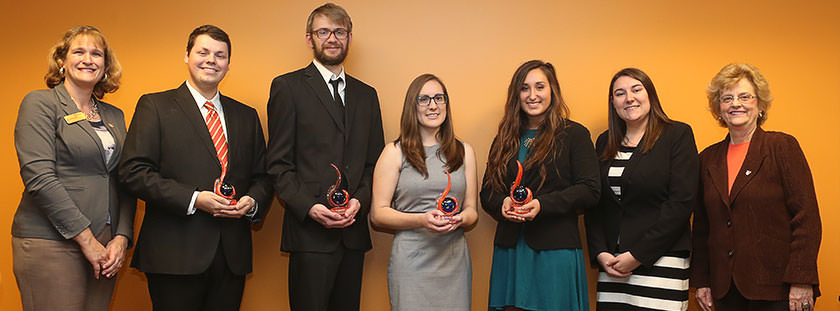Undergraduates add international experience to resumes
 Celebrating student achievement at the Embracing Global Engagement awards ceremony were (left to right) Cordula Mora, Nicholas Frank, Matthew Thome, Alexis Czajka, Allison Marino, Maria Nielsen and President Mary Ellen Mazey.
Celebrating student achievement at the Embracing Global Engagement awards ceremony were (left to right) Cordula Mora, Nicholas Frank, Matthew Thome, Alexis Czajka, Allison Marino, Maria Nielsen and President Mary Ellen Mazey.
By Bob Cunningham
Whether looking for a job or applying to graduate school, it’s hard to stand out from the pack these days – even with a great GPA.
That’s why it’s so important to have experiential learning on your resume. There are multiple ways to learn outside the classroom, including internships, co-ops and studying abroad.
More than 20 students from BGSU’s Center for Undergraduate Research and Scholarship (CURS) recently gave presentations about their experiences abroad. The top performers were honored with CURS Global Engagement Awards on Nov. 18 at the Bowen-Thompson Student Union.
“Thanks to the faculty and mentors, these outstanding students have now had their lives transformed because they’ve been a part of this great project here at the University,” said President Mary Ellen Mazey. “When you travel abroad, you learn so much not only about that country but also about yourself.”
Each student received an engraved glass sculpture designed by former art student Austin Littenberg.
“Experiential learning is something we want to encourage,” said CURS director Dr. Cordula Mora. “It’s important that you don’t just sit in the classroom and you get out and experience new things and different cultures. I keep telling students that a good GPA isn’t enough anymore because you’re competing with other people who also have wonderful GPAs.”
Allison Marino, from Stow, Ohio, and Maria Nielsen, from Sandusky, Ohio, both currently first-year graduate students in curriculum and teaching who studied abroad as juniors majoring in adolescent-to-young-adult education in integrated mathematics, presented on their experience teaching math education and cultural experiences in Thailand. Each came away with a new appreciation for different cultures.
“This was my first experience of managing a classroom and leading the engagement of students’ learning,” Marino said. “Through all of these experiences, I was able to become a more well-rounded individual and educator. Not only did I learn so much about the culture and education system, but also I was able to form new relationships with the Thai people. All of these experiences and relationships formed in Thailand were priceless and unforgettable.”
“For me, the idea that I can teach math to students who may speak a different language, but they still learn because math is universal was amazing,” Nielsen said. “Even if we’re not speaking the same language, we can still have a conversation about mathematics.”
Alexis Czajka, a senior from Riverview, Mich., majoring in French with a minor in international studies, investigated the importance of strikes and protests in France, a tradition that she said dates to the French Revolution.
“My presentation was really about breaking the stereotype of the French always being on strike and never going to work,” Czajka said. “It was really an eye-opener being immersed in the country and seeing these stereotypes aren’t really true as you learn about their culture from their perspective.”
Nicholas Frank, a senior from Perrysburg majoring in world language education specializing in Spanish, is interested in the globalized classroom. His project explored how the integration of technology affects students’ communicative and cultural proficiency in a second language when connecting two world language classrooms in the United States and Spain.
“I guess what I was really hoping to show students through this project is that it’s a lot easier to interact with different people than we make it seem,” Frank said. “Just giving students that opportunity to talk to somebody from another country is a really good perspective on interacting with a different culture.”
Matthew Thome, a senior from Medina. Ohio, majoring in adolescent-to-young-adult integrated language arts education, traveled to Japan to learn more about atomic bomb survivors, peace education and the problems with only teaching a U.S.-centric historical narrative in regard to the end of World War II.
“I went to Hiroshima and it really was a life-changing experience,” Thome said. “I got to see the prime minister of Japan, Shinzō Abe, speak. It’s really powerful to stand in front of the cenotaph (at Hiroshima Peace Memorial Park and Museum) and there’s all the names of every person killed by the atomic bomb and to know that President Obama had visited recently and left his mark. It was amazing to see the turnout of the people from all around the world to come and pay their respects.”
Updated: 12/02/2017 12:38AM
